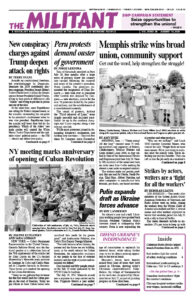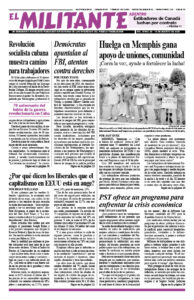August 10, 1998
GUANICA, Puerto Rico — Tens of thousands of independence supporters marched and rallied here July 25 commemorating the centennial of the U.S. invasion of Puerto Rico.
Held at the very site where U.S. troops landed in 1898, the event was the first time in years that the commemoration was a joint action by all pro-independence forces on the island. The main organizations involved were the Puerto Rican Independence Party and the Hostos National Congress.
Chants included “Viva Puerto Rico Libre!” and demands for freedom for 15 Puerto Rican independistas in U.S. prisons. The same day 1,500 people from across the U.S. marched to the White House, marking 100 years of resistance to Washington’s rule over Puerto Rico. Some 2,000 more marched in New York City and 400 in San Francisco.
August 3, 1973
The July strikes in Puerto Rico marked a turning point for the island’s labor movement. The workers who played the most active role were sanitation workers; firemen; and the irrigation and electrical workers, who are organized in the Irrigation and Electrical Workers Union (UTIER).
The strikes by the firemen and UTIER ended in mid-July. In both cases the government granted concessions. In 1968 the millionaire Luis Ferre was elected governor. Ferre’s four years in office led to a weakening of the government’s hold on the union bureaucracy.
This, along with the fact that prices have gone up more than 21 percent since 1967, has led to growing resistance by Puerto Rican workers, shown over the past year and a half by the strikes of the El Mundo workers, teamsters, and telephone workers.
August 16, 1948
National uprisings continue to spread in the Far East and shake to their foundations the empires of the Western imperialists. To the growing list of Asiatic peoples fighting for their independence is now added Malaya.
For upwards of a century its natives have been ruled and exploited by British imperialism through a system of indirect rule of native sultans. The country is a key sector of the British Empire as it is the world headquarters of the rubber and tin industries. The natives, suffering from food shortages and a raging inflation, have now risen in revolt.
Despite the pouring in huge numbers of troops, the French and Dutch have been unable to suppress the uprisings of neighboring Indo-China and In-donesia, and are losing the wars, it is obvious that the British are in for a long struggle with every chance of defeat.

